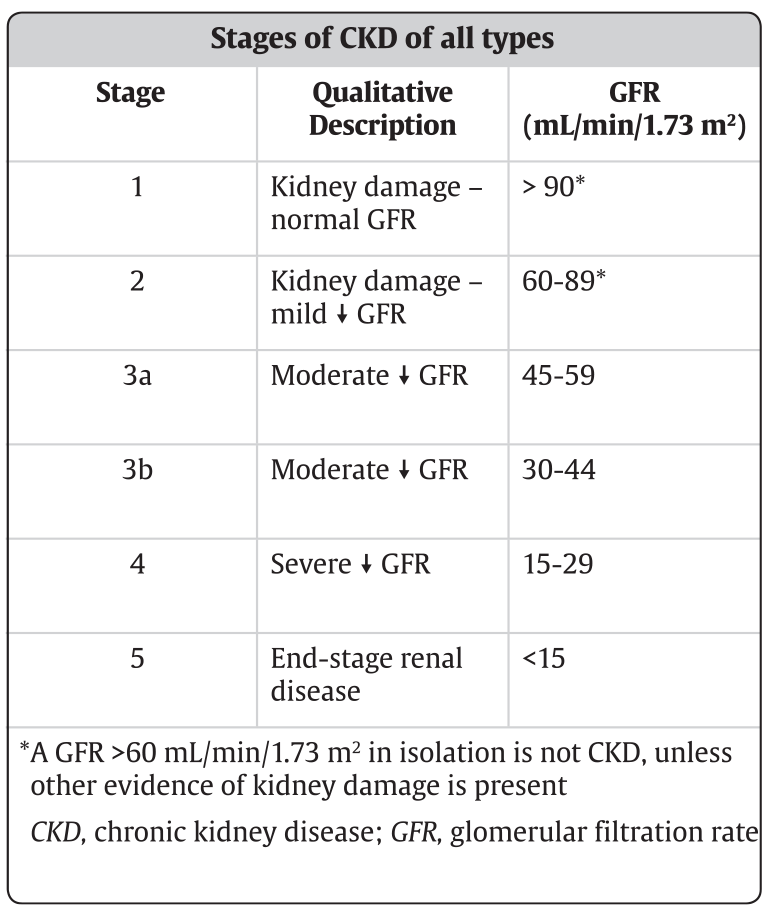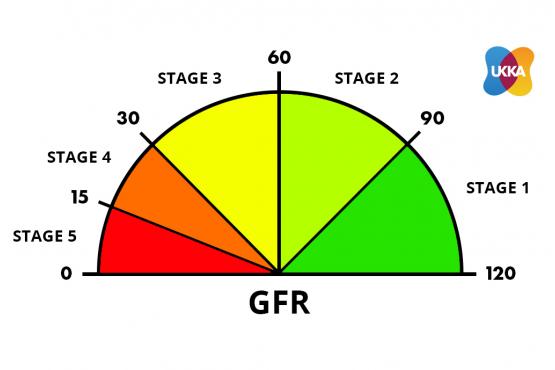At what CKD stage should you see a nephrologist?
CKD Stage 4. At the latest. That is the short answer.
You should see a kidney specialist, called a nephrologist, when your eGFR (estimated glomerular filtration rate the key measure of kidney function) is less than 30 mls/min. This occurs at Stage 4 CKD. The creatinine blood test is likely to be 150-200 mcmol/L at this point.


Courtesy of UKKA
CKD has 5 stages based on the GFR (based on the blood creatinine level).
Other indications for referral
Note. It is not as simple as we have described [“is it ever!?” CKDEx Ed]
It is not just the CKD stage (based on GFR/creatinine) that decides whether you need to be seen. There are other factors that affect the need for referral:
- If CKD is worsening rapidly. If you have CKD1 but progress to CKD3B (say) in 6 months this can be ‘worse’ than being stable in CKD4. So the rate of decline of kidney function is as/more important than the stage
- Unclear diagnosis – i.e. the cause of your CKD is not clear
- Very high BP – that is difficult to control
- Family history – of CKD/ESRF (e.g. polycystic kidney disease, PKD)
- Alot of protein in your urine (proteinuria) – especially if your urinary ACR (uACR) is over 70 mg/mmol. Normal is under 3 mg/mmol. This can occur with normal kidney function (GFR over 90 ml/min). It may be a sign of nephrotic syndrome.
- Macroscopic haematuria (blood in the urine that you can see) – and a kidney surgeon (urologist) has not found a cause.
Note. Patients with CKD3B should be discussed with a nephrologist, even if not all of them need to be seen.
What will the nephrologist do first? (establish a diagnosis)
The initial role of a nephrologist is to:
- Confirm you have CKD
- Confirm your CKD Stage – and the rate of decline
- Determine the diagnosis – i.e. why do you have CKD? Doctors consider CKD is a syndrome – i.e. a pattern of chronic illness, with different causes/diagnoses – not a diagnosis in itself. There are 7 common causes, all with different treatments.
How does the nephrologist make the diagnosis of CKD?
They do this by asking you questions (called the ‘history’), examining you, and carrying out investigations – including a battery of blood and urine tests and a renal (kidney) ultrasound. A few patients (not many) will require a kidney biopsy.
What will the nephrologist do next (i.e. to treat your CKD)?
Whatever the cause, your nephrologist will treat Stage 4 CKD with medicines that help your symptoms; and other health problems related to chronic kidney disease, such as diabetes and high blood pressure.
These medicines include:
- Blood pressure medicines like ACE inhibitors and ARBs (unless you have renovascular disease) – even if you do not have high blood pressure, these medicines can help slow the damage to your kidneys to keep them working well as long as possible
- Adjust diabetes medicine (if you have diabetes) – to keep your blood sugar at a healthy level
- Calcium and vitamin D supplements – to keep your bones strong
- Diuretics to reduce swelling (oedema) – to help your kidneys get rid of salt and water, by making you urinate more
- Erythropoiesis-stimulating agents (ESAs) (and/or iron supplements) – to treat anaemia (not enough red blood cells in your body).
Your doctor may ask you to stop taking medicines that can damage your kidneys, such as pain medicines called NSAIDs (nonsteroidal anti-inflammatory medicines).
Specific treatments
As well as the treatments above, specific causes of CKD require specific treatments – e.g. a urinary catheter in obstructive nephropathy (often due to prostate problems in men), or drugs to suppress the immune system in chronic glomerulonephritis (GN).
If this does not work, what next (dialysis or a kidney transplant)?
Your nephrologist will decide if your kidneys are close to failure (Stage 5 CKD) and if you need to start treatment. If you need treatment, they will talk with you about your choices, which include:
- Dialysis – which is a treatment to clean your blood when your kidneys are not able to. There are 2 types of dialysis.
- Kidney transplant – which is surgery to give you a kidney from someone else’s body.
Note. Fortunately only about 1 in 100 of people with CKD end up in CKD5 and need dialysis or a transplant.
It’s not just about seeing a nephrologist (you should see a specialist renal nurse practitioner too)
Most nephrologists work with a specialist renal nurse practitioner. It is important to see one of them too. Ask your nephrologist, if they work with one and get referred. There is evidence you will get a better outcome if you see one as well as a specialist doctor.
They are especially good at making sure you are on the right drugs, and preparing people for dialysis and organising kidney transplants. They are very nice and may be easier to talk to that your doctor!
Does CKD get better?
Yes, it can do. In fact, in this large Canadian study, advancing age, CKD regression (getting better) or death (i.e. die with it, not from it) were more likely than CKD progression or kidney failure: Liu, 2021.
Summary
We have described at what CKD stage should you see a nephrologist. Stage 4 CKD (or before if kidney function deteriorating). A minority of patients get to this stage. We hope it has been helpful.
Other resource
Do nephrologists agree on who should be referred to them?
Last Reviewed on 22 June 2024
